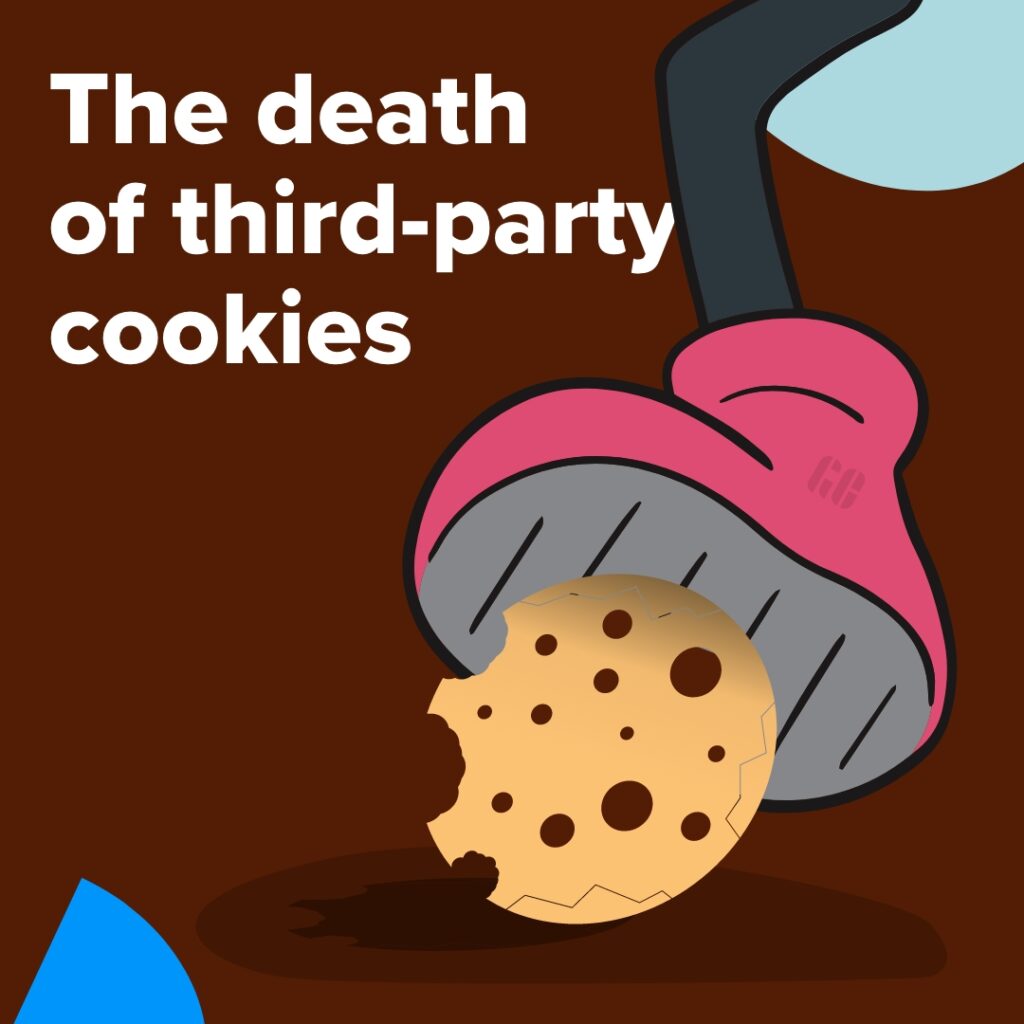On January 4th, Google rolled out tracking protection to 1% of Chrome users globally. This new feature is part of the larger plan to phase out third-party cookies in 2024.
What does the death of third-party cookies mean for digital marketing and how will companies need to adapt? Let’s take a look.
What are cookies?
Before talking about third-party cookies, it makes sense to cover first-party cookies first.
First-party cookies
First-party cookies are placed on a user’s device by a website the user is visiting. When visiting a site, users are prompted to accept cookies and first-party cookies are there to collect information about user activity on that site. Essentially, the data collected enables the site to improve user experience and functionality.

First-party cookies are considered harmless as they’re not a ‘spying’ tool, but they can be used as an analytics tool to gather data – something we’ll come back to later.
Third-party cookies
Third-party cookies, on the other hand, gather data about a user’s browsing activity across the internet in order to understand overall browsing habits. Embedded on a user’s device, they’re created by companies other than the site you are visiting to collect data about your activity.
What data can third-party cookies collect?
- Sites a user visits
- How much time a user spends on a page or site
- Items a user has looked at or added to their cart
What’s the aim of third-party cookies?
The aim is to build up a picture of a user’s habits across multiple websites to create a clear picture of online behaviour. Why? When a user revisits a site, they’ll be shown items and articles they may have previously looked at or may like (based on previous visits). By storing this data and offering it back up to a user in future visits, the chances of a conversion are increased.
Third-party cookies are one of the most consistent ways to send users targeted advertising across the web.
The problem with third-party cookies
- Privacy – third-party cookies can be considered an invasion of privacy because of the significant amount of personal information that can be collected about a user.
- Security – worst case scenarios is they’re used for malicious reasons with users being tracked in order to steal personal information.
- Clarity – It’s often the case that many users are unaware of cookies being used to track their activity.

Why are third-party cookies going away?
Google will be eliminating third-party cookies by late 2024. Originally, this date was intended for 2022, but was pushed back to allow sufficient time for new provisions and alternatives to be developed and tested.
The main reason for them being phased out is privacy with users from various studies raising their growing concerns over data privacy online.
Before 2018, users had no control over when they were tracked with cookies, however two key regulations did come into place in 2018 in regard to third-party cookie tracking.
- GDPR (General Data Protection Regulation) and CPRA (California Privacy Rights Act).
GDPR sets out that websites have to ask for consent before using cookies on users in the EU and EEA.
The two regulations have restricted how companies can use cookies, but they have improved the quality of data collection, with users in control and able to decide which cookies they will allow to collect data.
Even with these measures in place, third-party cookies are still set to disappear.
How will the death of third-party cookies affect marketing?

You may be wondering what advertisers will do once third-party cookies have gone. No longer being able to rely on them, advertisers will need to switch up their tactics and look to first-party cookies or other alternatives to gather information for targeted advertising.
Are there alternatives to third-party cookies?
Google’s Privacy Sandbox is an initiative created to design technologies which protect individuals’ privacy online but still offer companies tools to target audiences. Still being developed, Privacy Sandbox for the Web looks to use the latest privacy techniques, including:
Unlike third-party cookies, all the user data remains in the Chrome browser and Privacy sandbox is an industry wide effort set to strengthen privacy and provide safer alternatives to tracking users’ behaviour.
Other alternatives to third-party cookies
Google’s Privacy sandbox is just one alternative. Other routes companies may turn to are tried and tested strategies like Search Engine Optimisation (SEO) and content marketing. Here are 4 alternatives proving popular in light of the impending phase out.
4 third-party cookie alternatives
· First-party cookies
Site owners can create personalised advertising based on their site visitor data.
· Contextual advertising
Advertising can be created through the analysis of keywords and phrases in the content of a webpage. This is particularly useful for highly themed content which attracts users with a specified interest.
· Device fingerprinting
Through collecting information on a device such as fonts, device model, screen resolution and user’s IP address, a unique ‘fingerprint’ can be created to detect a specific user. This information can then be used for targeted advertising.
· Alternate identifiers
Unique user IDs allow different brands to identify users through combining information such as email address, mobile number, browsing behaviour and social media IDs. Alternate IDs allow efficient and more personalised targeting of audiences without interfering with privacy.
How GetCrisp can help?
If you rely heavily on third-party cookies, it’s time to start looking into, trialling and leveraging innovative technologies and strategies as soon as possible for the best chance of success.
Once third-party cookies say their final farewell you need to have a solid plan of attack in place. Investing in other digital marketing strategies is more important than ever. Our team can support you to make the most of your marketing, just get in touch.
